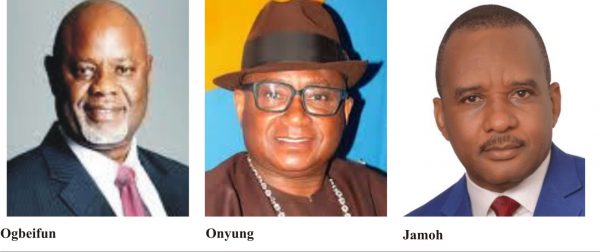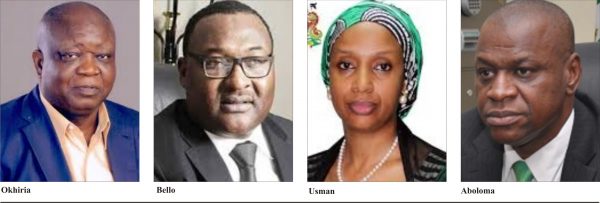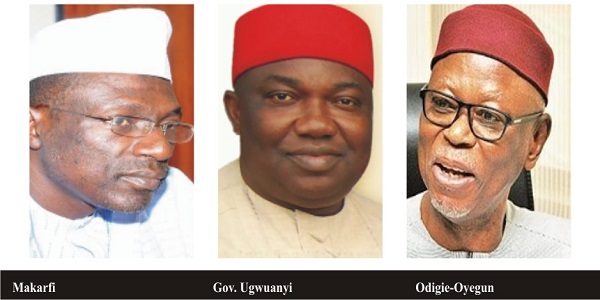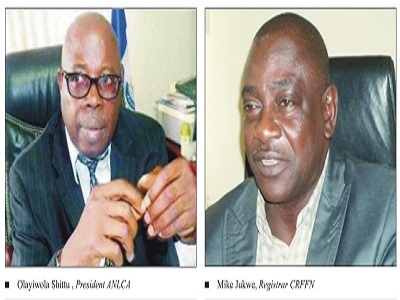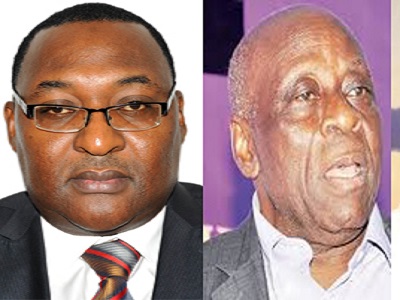The Politics Of CVFF And Nigeria’s Shipping Sector
By Kenneth Jukpor
“CVFF to a large extent is being politicized.”
This statement was echoed by a leading Nigerian ship-owner and Chairman of Starz Investments Company Limited, Engr. Greg Ogbeifun at the 2022 stakeholders’ forum organised by the Alumni of Maritime Academy of Nigeria Oron (AMANO) on Thursday, last week.
Barely 10 minutes after Ogbeifun’s submission, the Director General of Nigerian Maritime Administration and Safety Agency (NIMASA), Dr. Bashir Jamoh repeated the same assertion about the politicized handling of the Cabotage Vessel Finance Fund (CVFF).
CVFF was created under the Coastal and Inland Shipping Act, otherwise known as the Cabotage Act 2003 and it was set up to promote indigenous tonnage in shipping under the Cabotage regime.
The fund accrues from a two percent contribution by ship owners involved in coastal and inland shipping trade in Nigeria. NIMASA was mandated by law to serve as custodian of the fund and to disburse it to ship owners at single digit interest rate. However, since its establishment more than 18 years ago and with more than $250 million accruing into the CVFF account, no ship owner has been able to access it.
At the AMANO summit, Nigerian shipowners accused the federal government of tampering with the proceeds of the CVFF, calling for a forensic audit to determine its true value before setting guidelines for its disbursement.
Meanwhile, the Director General of NIMASA, Jamoh claimed the fund remains domiciled in Treasury Single Account (TSA) which makes it difficult to be tampered with.
A recurring problem which has hindered the disbursement of the fund is the guideline for disbursement but it’s strange that after 18 long years of promising to disburse CVFF to deserving ship owners; the federal government has been unable to review the guidelines.
There have been everal attempts to review the guidelines in the past, with the most recent occurrence in 2020 when the Transport Minister set up a Committee comprising ship owners, NIMASA leadership and other stakeholders to review the guidelines. All attempts failed perhaps due to politics which includes the long and arduous bureaucratic process of changing or updating laws in the country.
The problem has lingered and despite the approvals by Mr. President and the Attorney General of Federation (AGF) for disbursal of the fund to ship owners in 2021, the President later rescinded his approval and the hopes of indigenous shipowners hit the rocks again.
Sadly, the withdrawn approval came barely one month after NIMASA said it had selected 11 indigenous ship owners to benefit from the fund, and that four Primary Lending Institutions (PLIs) would midwife the process of the disbursement after the guidelines for the disbursement is developed.
While speaking at the AMANO event, Jamoh said: “As I’m talking to you I’m supposed to be in Abuja addressing CVFF issues severely. We have been on this for years and we have been talking; but we want the practitioners to see actions. I’m scheduled to be in Abuja to address some of the grey areas affecting the disbursement. I have given my word on the disbursement and I’m still going to reiterate that CVFF will be disbursed.”
“The issue of audit that was raised by Engr. Greg Ogbeifun, it is part of the statutory requirement which stipulates that every year the NIMASA accounts must be audited. This audit includes the CVFF account. The CVFF account can’t be audited in isolation and that audit is being monitored by the Auditor-General of the Federation and the National Assembly that has the constitutional right to check and know what is in the fund. We know the amount of money we have there, and it’s still there because nobody can touch that money. The money is in the TSA. So, no one has direct access to the fund.”
Nevertheless, he agreed that there are technical issues regarding the disbursement but reassured that the agency will do all that has to be done to address these issues.
“At the middle of last year, we called for expressions of interest from banks in line with the Act. Four banks applied and we have shortlisted them. This means we aren’t sleeping because we are working on it. We sent it to the appropriate quarters so they can study and review it before sending it back to us. This review is what we are currently doing but approval also has some technical issues,” he posited.
Experts, however, have drawn the attention of NIMASA and the Transport Ministry to the Nigerian Content Intervention (NCI) fund operated by Nigerian Content Development and Monitoring Board (NCDMB) which had been successfully managed and disbursed by the Bank of Industry Limited (BOI).
Speaking with MMS Plus recently, the President of Ship Owners Association of Nigeria (SOAN), Dr. Mkgeorge Onyung compared the CVFF to the NCI, noting that NCDMB has disbursed over $500million and has generated over $750million in the NCI Fund which started in 2010, he lamented that CVFF which started eight years before NCI has benefitted no one even as the present amount in the purse speculated to be about $250million.
Perhaps, NIMASA and the Transport Ministry could model the CVFF after NCI for easy and accountable disbursements.
On his part, Engr. Greg Ogbeifun said that the Transportation Minister must come up with guidelines taking cognizance of the fact that the funds are no longer in commercial banks but in the Central Bank of Nigeria (CBN).
“If you take the existing guidelines and read through it, you will find that there is a role that the Primary Lending Institutions (PLIs) have to play and until that role is played or there is a new arrangement, anybody touching that fund is committing a crime,” he said.
Meanwhile, Ogbeifun called for a forensic audit to determine its true value before setting guidelines for its disbursement.
Speaking at the AMANO forum with the theme, ‘The State of the Nigerian Maritime Domain in 2022 and Beyond’ Ogbeifun lamented that since the establishment of the Cabotage Act not a dime of the fund has been disbursed, while operators continue to contribute two percent of their contract values into the fund.
“We need to forensically carry out an audit to determine how much has been accrued into that fund. We started contributing into that fund the moment it was established and as we speak, two percent of our contract value is still being deducted. We are stuck at the moment and anybody interfering with that fund is breaking the law. We need to review the requirement of the Act to enable that fund to be unlocked,” he said.
In his welcome address, the AMANO President, Mr. Emmanuel Maiguwa noted that the effects of the challenges in the shipping sector, including poor capacity of ship owners, worsens the forex problems in Nigeria.
His words: “Direct financial benefits from the seas via employment is a critical element in the country’s forex earning. Effective seafaring is a tool to curb urban migration because as a seafarer doesn’t need to be in the city when he only needs to be on the ship. So, a country with a significant number of seafarers wouldn’t worry too much about urban migration.”
Meanwhile, he lamented that a situation where a country isn’t able to certify its seafarers or create an opportunity onboard vessels for seatime experience, means there is no career projection for seafarers.
“There is so much frustration in the aspect of seafarers licensing. There are problems with the processes for seafarers’ documents and bilateral relationship between Nigeria and other countries for employment of Nigerian seafarers on non-Nigerian flagged vessels. The welfare of seafarers as enshrined in the MLC 2006, career development progression, availability of platforms for seafarers training and employment are also challenges,” he said.

